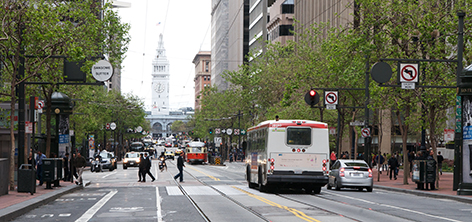
By Tim Redmond
SEPTEMBER 28, 2015 – The vast majority of the people who testified today at the Land Use Committee on the Transportation Sustainability Fee discussed the impacts on housing, hospitals, and educational institutions. The folks from the colleges said that student housing shouldn’t have to pay a fee. The folks from the hospitals say they are already suffering from the costs of seismic upgrades and shouldn’t pay the fee.
The housing developers complained that the costs were too high.
The transit advocates said that the fees across the board are too low.
I didn’t hear anybody say that commercial office developers would be so badly hurt by a higher fee that they would stop construction – or that, should that come to pass, it would be such a bad thing.
The committee listened to testimony and then continued the item. But the central discussion item was: At what point are we charging developers so much money for their project that the whole thing no longer pencils out? There was no talk of the notion that growth should pay for growth, and that a project that doesn’t pay for itself shouldn’t be built in the first place.
Planning and transportation officials explained how they came up with the proposed fees, which are, at best, equal to a third of the actual costs that the developers are sticking on the city – which means on the Muni riders, the taxpayers, the people who pay for parking meters … the rest of us will pick up the billion-dollar tab over the next 15 years to pay for the transit costs that developers are creating.
The city staff talked about the factors that would make a project “infeasible” – that is, fees so high that the developers will walk away. Alicia John Baptiste, a senior staffer at the Municipal Transportation Agency, said that if the reduction in the value of the land that a high fee represented hit 10 percent or more, the city would consider that a project killer – for the moment.
“Once you get past the 10 percent point typically you are putting a pause on development,” she said. “Over time, land values will even out.”
In other words: Make developers pay the full cost of their projects, and maybe we won’t need a Mission Moratorium. Maybe things will just slow down for financial reasons. And is that so bad?
There are some fascinating documents that underlie this discussion. The city analyzed the actual costs to public transit – that is, what every project really needs in terms of new services – and came up with a number for what developers legally could be forced to pay.
Then a separate analysis looked at whether those fees would discourage development.
The second part, of course, required the city to look at the real profit and loss in commercial and residential development today. And there are some eye-openers.
For starters, in nearly every single residential project that the city projected, the return on investment – the developer profit – exceeds 20 percent. The margins on office development are a bit lower, which is why so much capital these days is going into high-end residential.
So along comes developer Oz Erickson, who testified today that the margins on housing are so low a few minor fees could kill all of it. “It costs $800,000 a unit to build housing,” he said, “and the sales price is around $900,000. We are right on the edge.” He insisted that margins are as low as 6 percent.
“A one percent increase in interest rates will put an end to all residential development in San Francisco,” he said.
If that’s the case, why are there so many cranes? Why are developers spending so much money (more than they would have to pay in Muni fees) to stop the Mission Moratorium?
If building market-rate housing (and office space) is such an iffy idea in San Francisco, and can be killed by a transit impact fee, why is this one of the hottest markets in the world for real-estate development?
Both Sups. Scott Wiener and Malia Cohen talked about how the city was growing, fast, and will keep growing – as if that’s the inescapable natural order of things. But if the costs of that growth greatly exceed the benefits to the city – and the rest of us are going to have to pay the difference – isn’t it time to slow things down?
Just a thought.
The fee discussion was continued to next week.






